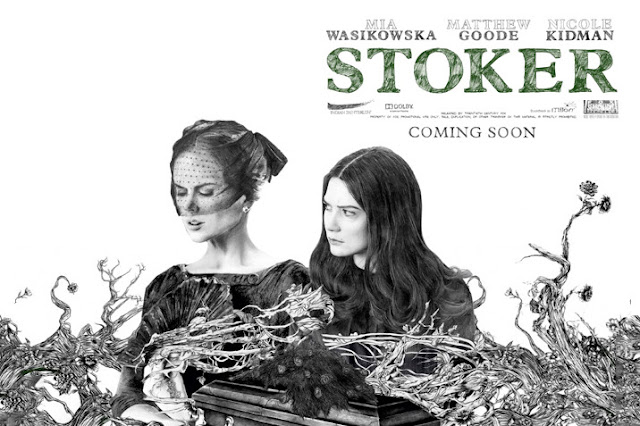 |
| Stoker movie poster |
Written by Stephanie Rogers.
If I were asked to describe my reaction to Stoker using an acronym, I’d go with “WTF,” although I definitely experienced some “OMG” and “STFU” moments here and there. By the end, I could hear myself mentally reviewing the film and toying with the idea of titling this piece merely, “OFFS.” That’s the overall reaction, distilled, I had to Stoker from the first five minutes of watching the film all the way to the final credits. I mean, I’m not saying I didn’t like it. Or even love it. Or possibly want to find all existing film reels (and whatever digital incarnations exist) and set them on fire. I just won’t be able to tell for a few months or so. It’s one of those movies.
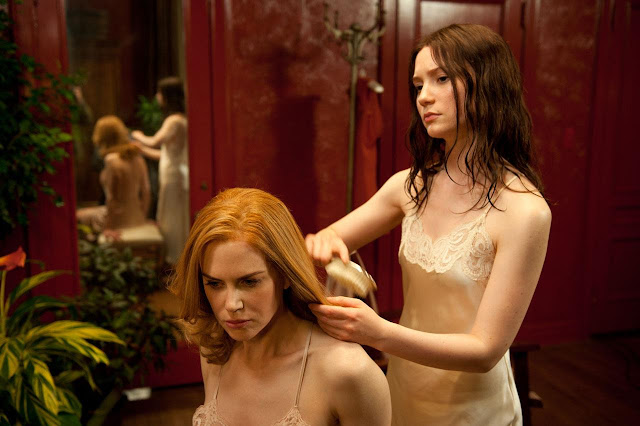 |
| Uncomfortable mother-daughter interaction |
In a lot of ways—okay, like, two—it reminded me of Silver Linings Playbook. Its genre-mixing, unpredictability, and innovative storytelling, particularly with how it illustrates the hereditary aspect of mental illness, works incredibly well. Of course, while Silver Linings Playbook can make a person joy-cry at the end, Stoker’s ending (and beginning and middle) should come with a Serious Trigger Warning for depictions of violence, sexual assault, and incest. I plan to address those things in this review as well, and I’ll also add a Spoiler Alert, if only to avoid writing a horrible paragraph like this ever in my life:
It’s hard to avoid spoilers at this point, but let’s leave it at this: India discovers that her parents have been concealing something very important regarding her uncle—and, given her emotionally close relationship with him, something very important about herself, about character traits that are a part of her own blood. When the truth comes out, her world is overturned, her monsters are unleashed, and she finds herself without the solid footing of character, self-knowledge, and moral clarity to fight them.
(It’s probably not nice to make fun of Richard Brody of The New Yorker, but since Vida’s Count recently showed us in its annual illustration of literary journals that unapologetically refuse to publish women writers or review the work of women writers, The New Yorker can go fuck itself. Also: “her monsters are unleashed” … No.)
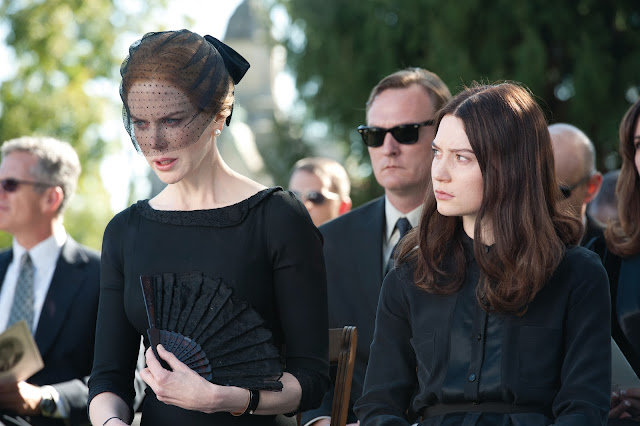 |
| Evie (Nicole Kidman) and India (Mia Wasikowska) |
Seriously though, what the hell did I just watch? One could categorize Stoker as any of the following: a coming-of-age tale, a crime thriller, a sexual assault revenge fantasy, a love story, a murder mystery, a slasher film, a romantic comedy (I’m hilarious), or even an allegory about the dangers of bullying, parental neglect, or keeping family secrets. Throw a recurring spider in there, some shoes, a bunch of random objects shaped like balls, along with a hint of incest, some on-screen masturbation, imagined orgasmic piano duets, and a handful of scenes that rip off Hitchcock so hard that Hitchcock could’ve directed it (see Shadow of a Doubt), and you’ll have yourself a nice little freakshow!
Seriously though, shoes and balls are really important in this movie.
 |
| Saddle Shoe (girlhood!) and High Heel (womanhood!) |
Unlike this review, Stoker starts off straightforwardly enough. Mia Wasikowska (our favorite) plays India Stoker, a comically quiet teenager reminiscent of Wednesday Addams, at least until she evolves into a full-blown psychopath, who hates to be touched, gets bullied by boys at school—they call her “Stroker”—and mourns her father (Dermot Mulroney) after his suspicious death in a car accident on her 18th birthday. Nicole Kidman plays Evie, India’s mother, in typical Kidman as Insufferable Ice Princess casting, and there’s pretty much nothing redeeming about her. She gloms onto her dead husband’s estranged brother Charlie at the funeral (played by Matthew Goode), whom she’s never met and never once questions the presence of, and when Mrs. McGarrick, her housekeeper of a million years mysteriously vanishes, she says things like, “Oh no, what will we do for dinner now!” with earnest incredulity.
 |
| Evie loses her shit on India (finally!) |
I realize Evie isn’t supposed to be likeable, that we’re meant to roll our eyes at her upper-class privilege and displays of affection toward her husband’s mysterious younger brother, that maybe we’re even supposed to feel a tiny bit sorry for her. But I despise one-dimensional women characters onscreen, and Evie is just that, a collection of simplistic tropes used to move the narrative forward: a bad wife, a bad mother, a bad boss (like, aren’t you even going to look for your missing housekeeper?), and a bad niece-in-law (Aunt Gin needs to talk to you alone for a reason, you idiot.) Her obliviousness to everything happening around her doesn’t read as the dissociated or even unstable response of a wife in mourning; it reads as the selfish and feigned cluelessness of a generally awful person.
 |
| Goodbye, Auntie Gin |
Evie—hats off to Nicole Kidman—eventually delivers one of the scariest monologues I’ve ever seen on film. It’s the first time she utters anything longer than a few sentences at once (which are usually about the importance of polite behavior and playing the piano), but this monologue, I mean, chills. It’s also the only time Evie exhibits just as much overt “crazy” as the other characters, and I found myself savoring that moment. Isn’t it funny how a character can become interesting once she’s allowed to do things other than comment on etiquette and pass out drunk?
I wish we got to see that less passive side of Evie earlier in the film because, the thing is, we don’t need to dislike Evie in order to feel sympathy for her daughter. It’s certainly possible to make characters bad and villainous while also making them complex and even charming. The makers of this film know that, too. You know how I know that? Because Charlie Stoker exists.
 |
| Evie and Charlie (Matthew Goode) |
This fuckin’ guy. He rolls onto the family estate during his brother’s funeral like he’s been there all along, and somehow, “I’ve been travelling the world for 20 years” seems like a reasonable excuse for his lifelong absence. Naturally, he decides to move in with Evie and India because why not, I’m sure everyone will be totally fine with that, nice to meet you! And they are. Except for Aunt Gin and Housekeeper McGarrick, who genuinely—rightfully—fear this bro, even with all his charisma and sexy-sheepish smiles. They know some shit. India mistrusts him at first, too, but the more she learns about him, and the creepier (and more murderous) he becomes, the more India identifies with him. Queue The New Yorker’s Richard Brody: her monsters are unleashed.
Accompanied by a few feminist themes.
 |
| India imitating a yard statue, accompanied by saddle shoes |
For one, I don’t think it’s possible to not read Stoker as a coming-of-age tale, mainly because it puts so much emphasis on India’s burgeoning womanhood. We see her in flashbacks as a young girl, a semi-tomboy who hunted birds with her dad, who wore the same pair of black-and-white saddle shoes all her life—she received a bigger size every year on her birthday (remember, shoes and balls are really important in this movie)—who never identified with her beautiful, quintessentially feminine mother, and whose experiences with boys include stabbing one in the hand with a sharpened pencil (loved that) when he and a group of friends sexually harass her behind their high school.
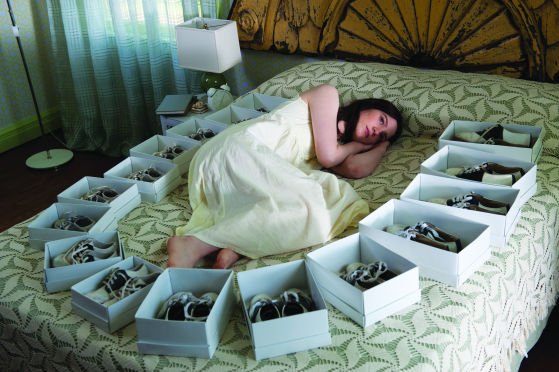 |
| These fucking shoes! |
That foreshadows India’s upcoming attempted rape … because what would an onscreen coming-of-age tale of burgeoning womanhood be without an attempted rape scene? (I’m only half-joking here; considering one in three women lives through a sexual assault in her lifetime, and most films seek to reveal some Truth About Humanity, I’m surprised the issue of sexual assault and rape isn’t addressed more often—and accurately—onscreen. Oh wait, I forgot we’re talking about women’s stories here: UNIMPORTANT.) Um.
In my mind, the film exists in two parts: everything that happens before the attempted rape and everything that happens after it.
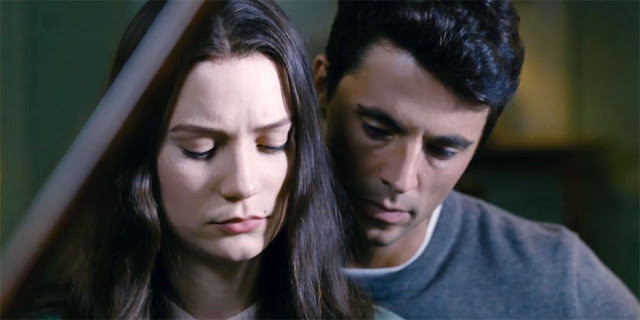 |
| I’m sure this is a 100% acceptable uncle-niece interaction |
Stoker addresses India’s sexual feelings early on; she clearly feels an attraction toward her uncle, and she seeks out a boy from school immediately after she catches her mother and uncle kissing. The juxtaposition of these scenes—India watching two people engage in sexual activity and her subsequent desire to do so herself—touches on a couple of familiar adolescent emotions. One could read India’s reaction to discovering her mom and uncle’s indiscretion as a big Fuck You to both of them. One could also read India’s reaction to discovering her mom and uncle’s indiscretion as an attempt to behave like an adult, to emulate what she sees (remember: coming of age!). Both of those responses ring true to me, and Stoker effectively captures the confusion inherent in leaving the familiarity of girlhood and entering a not-yet-entirely-defined womanhood.
But India decides during her make out session in the woods with the rapist that she doesn’t want to do anything more than kiss, at which point she tells him she wants to go home. He ignores her, physically assaults her, and attempts to rape her. And that’s when her monsters are unleashed. (I can’t stop saying it.)
 |
| India as Hunter |
I won’t reveal what happens during this scene because—damn—but believe me, it changes everything for India, for everyone. From here until the end of the film, Stoker explores India’s equating of death and violence with sexual awakening, and it looks at the relationship between power, innocence, and what it means for a young woman to lose both. It also asks a question about choice, about how much power we really have over ourselves, our actions, over who we become.
The film opens with a voiceover (that bookends the film) of India telling us, “Just as a flower does not choose its color, we are not responsible for what we have come to be. Only once you realize this do you become free.” This, contrasted with what the film reveals about Charlie’s past and India’s present—and the similarities of both—raise an important, albeit subtle point regarding mental health and the genetic predisposition of mental illness. Stoker takes it even further though, with a welcomed feminist slant; because, while India seems to make difficult choices to protect her mother and herself from violence at the hands of men, we’re ultimately left wondering just how much of a choice—like many women in relationships with abusive men—she really has.

nicole does look good in this, though i’m generally not a fan of hers. i love the creepiness appeal!
Oh yeah — she’s fabulous.
Stephanie, Thank you for the review. I really enjoyed your writing style and your subtle references to “her monsters are unleashed” in lieu of the NYT writer using such a trivial cliche. I’m glad you pointed that out too, as most readers don’t get that far in a standard movie review, of how other writers seem to skim by, never really diving any deeper than their cut and paste cliche text-files. Besides how you “covertly” basically called him out on that, I thoroughly enjoyed reading the rest of the review in its entirety. From just watching the trailer, I had assumed Nicole Kidman’s character would be portrayed almost exactly as psychologically cruel as you depicted her. And while I wasn’t sure about India’s character or what or who she would become, your synopsis is more than likely spot-on. I enjoyed how you related this movie to the role of women surviving abusive relationships, as that is important to actually point that out. Also, connecting the dots between mental illness, and all of the other leaps and jumps you made in describing this film, makes it sound to me that it is a real psychological thriller (among other possible genres.) So again, thank you for an honest contribution to a review of this film. The honesty, although sometimes comical and sometimes cynical, still rings forth as truth… worthy.
I loved this one, and I totally agree with you about the monologue at the end of the film. Kidman shined in it.
I only had watched 20 mins this movie, but I thought it was usual and different then many other movies. So I had to figure what was going on. Thank you Stephanie for your review on this movie.
india has antisocial and psychopathy tendency- she gets pleasure from killing that’s why his father took her hunting-to prevent something bad getting worse, he didn’t want her to become like his brother. nothing to do with abusive men etc, India enjoys the sight of murder and took advantages of it. cut the feminist crap.
You wouldn’t call a dude serial killer and a rapist “abusive men”? And therein lies our problem.
Beautifully put. A very intriguing film, which you described perfectly
However i didnt quite understand how the balls and spiders played symbolically. I understand the shoes and the coming of age part. Please explain.
I honestly didn’t get the balls and spiders either …
OOOOOOHHHHH I’m SO going to watch this! This review makes me want to watch it even more! And really, the “Insufferable Ice Princess” was actually not part of her style in Moulin Rouge or Bewitched. It was quite refreshing.
An allegory is a depiction of a real drama set out in a seemingly disconnected way. This movie is not an ‘allegory’ for parental neglect, the dangers of bullying or keeping family secrets, because they are present elements in the film. Also, her father knew of her killing urges and instead of allowing it to fester he took her hunting. “Sometime’s you have to do something bad to stop it from getting worse”, or whatever the quote is. Remember? It has nothing to do with abusive relationships. She and her uncle never truly enter into a relationship, she is simply infatuated by him because he shares her unusual tendency and carries it off smoothly. This movie could be a lot of things, but I can say with sheer certainty that the moral of this film does not include feminist aggression. No. This review focuses too much on the surface (and incorrect) details. In other words, you’re not seeing, you’re just looking. There is no depth to this review as it focuses on India and the fact that she is female. It seems like all you picked up from this movie was the fact that the men were violent and the women were helpless. Was India not violent? Had her uncle not killed her father? I struggle to see what exactly you believe was the moral of the story. “They rightfully fear this bro”, uh was it because he had a history of mental illness? Because he killed both his brothers, perhaps? You make it sound like it was because of his gender that automatically prompted an antagonistic presence. Through use of ‘humorous’ language, you almost managed to carry off the fact that you know nothing about the film or it’s deeper meaning. As I have taken a page from India’s book, and can “see small things clearly that others cannot”, I implore you to rewrite this review in an unbiased light, and to truly inform readers about the film of which you babble so incessantly, instead of attempted brainwash.
P.S. Fix the grammatical errors.
Are you requesting that I fix the grammatical errors in your comment? Feel free to handle that yourself. My reading of the film is ONE reading. There are obviously other interpretations. I’m not hostile to other interpretations. Why are you?
I thought the spider was fairly obvious. The spider was symbolic of Charlie. Dangerous and surreptitiously crawling up between India’s legs. And the way the first scene of the spider show it going toward her feet while she’s using the peddle at the piano…Will the spider bite her or will she crush the spider? We don’t get our answer until near the end. The balls I’m not so sure.
The most accurate, best written movie review i’ve ever read! Thank you for posting this! 😀
You are a *great* critic! Hoping you are a young woman and will be doing this a long time.
This is the most accurate, interesting {hilarious} review Ive read yet. When I first saw this movie I was quite shocked at the ‘artsy’ part of it and how they didn’t use many words but the actions explained it all. Though the movie seemed to disappoint a lot of people, pretty much everyone, at least I have FINALLY found one person who seemed to understand more and even enjoy it more than hated it.
BRILLIANT Review!!! I just found your site and I love the whole thing. I also agree with the others here in saying this is truly the most accurate, enjoyable and delightfully written review I have ever read, hands down! You nailed this film. Plus ANY review that can use WTF, STFU and OFFS in the same review and it STILL be a completely accurate description of the movie experience?? DELICIOUS! You have fried gold, Grrrrrl.
Um. I now love you because of this review. <3
This is by far the best review I’ve seen of an unjustly neglected film worthy of David Lynch.
I didn’t see India as suffering from hereditary mental illness so much as identifying with her abuser.
I also didn’t see it as realistic. Rather, I saw it as a series of visual, poetic tropes designed to bring us into India’s head.
Stabbing the bully with the pencil, for example. It wasn’t realistic. But it did express what she wanted to do to the bullies. Her uncle lurking in the shadows seemed to indicate she was beginning to channel his aggression for her own purposes.
I did not like it at all. It was a creepy weird film.